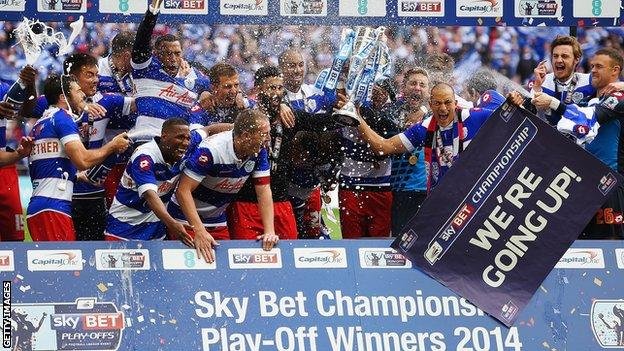Queen Park Ranger’s 2011 promotion to the Premier League was nearly taken away from them after the illegal transfer of Alejandro Faurlin came to light.
As QPR romped to victory in the 2010/2011 EFL Championship season (then-known as the nPower Championship), plans were being made for their entrance into the Barclays Premier League.
Huge transfers were planned, including Premier League and Champions League winners like Rio Ferdinand, Ji-Sung Park and Julio Cesar, to name but a few.
However, their promotion party was almost derailed by the discovery of an illegal transfer the season before.
When Argentine football Alejandro Faulrin made the switch from Instituto Atlético Central Córdoba to QPR in England, it seemed like a decent signing of a young promising talent from a footballing hub of the world.
Making 81 league appearances in his first two seasons in London, Faurlin was seen as a very shrewd signing by Neil Warnock, slotting immediately into the first eleven and performing above and beyond what the club had expected.
While the Hoops finished 13th in his first season with the team, a year later he partnered Adel Tarrabt in midfield as Neil Warnock led QPR into the Premier League for the first time since 1996.
However, their well-earned promotion, thanks to 88-points in 46 Championship matches, almost didn’t come to be. The club were charged with illegally registering and playing Faurlin throughout the 2009/10 season, after his third-party ownership scheme was revealed in early 2011.
The £3.5 Million transfer fee for Faurlin was fabricated, with the transfer being much more suspicious than it first seemed. Third-party ownership reared it’s ugly head once again.
What Is Third-Party Ownership In Football?

Third-party ownership (TPO) in football refers to a situation where a football player’s economic rights are owned, in whole or in part, by a third party, which is typically not the player’s club.
This means that somebody who is not the football club own certain rights in relation to a player, so that the clubs cannot claim to own the footballer’s contract outright.
In such arrangements, investors or external entities acquire a stake in a player’s future transfer value, often in exchange for providing financial support to the player or the club.
This is often used as a way for third parties to exploit younger, poorer players who do not have the knowledge on how the sport is run at a professional level.
Historically, third-party ownership was more common in countries like Portugal and Brazil, but it has faced increased scrutiny and regulation by football governing bodies.
The most famous example of this was Carlos Tevez, who was found to have been illegally playing for West Ham when his goals relegated Sheffield United in 2007 (ironically, managed by Neil Warnock at the time).
FIFA banned third-party ownership in 2015, deeming it incompatible with the principles of the game. The ban was implemented to enhance transparency, protect the integrity of competitions, and ensure that player transfers are conducted with the best interests of the sport in mind. It sought to make transfers more transparent and fairer to all involved.
The concerns associated with third-party ownership include the potential for conflicts of interest, manipulation of player transfers, and challenges in maintaining the competitive balance within leagues.
By prohibiting such arrangements, football authorities aim to maintain the integrity of the sport and ensure that decisions regarding players are made with the primary focus on football-related considerations rather than financial interests of third parties.
Alejandro Faurlin’s Transfer To QPR

Going back to QPR, Alejandro Faurlin’s transfer to QPR breached the FA’s rules regarding third-party ownership.
Faurlin’s economic rights were owned by American incorporated company TYP Sports Agency LLC, who had bought them from his previous club Instituto Atlético Central Córdoba for $250,000.
QPR claimed that the transfer of the Argentinian player cost them a £3.5 Million fee, paid to Instituo in 2009. However, it later came out that none of that money actually went to the club.
The Guardian reported that the club has been charged with seven breaches of Football Association rules in relation to the Faurlín signing and the renegotiation of his contract last October.
It came to light that Faurlin was owned by TYP Sports Agency for the entirety of the 2009/10 season, breaking the FA’s rules on third-party ownership.
This almost spelled disaster for Queens Park Rangers. Alejandro Faurlin was a key player for the club as they pipped Norwich, Swansea and Cardiff to winning the Championship that season, but his transfer seemed to have put their promotion in jeopardy.
Depending on them being found guilty of the charges, QPR would have been docked points from their title-winning season, which would have likely cost them the Championship trophy and promotion to the Premier League.
Luckily for Neil Warnock and company, QPR were not docked any points. While they were found guilty of two of the seven charges, the FA ignored calls from Swansea and Cardiff City to dock the Hoops points, and only fined them for their crimes.
The club were fined £875,000 (according to the BBC), with a verdict being announced just hours before they lifted the Championship trophy on the last day of the season, in 2011.
The incident had a huge impact on Alejandro Faurlin, who almost turned to suicide from the stress of the situation. Speaking to The Mirror in 2013, he claimed he would have ended it all had QPR been denied promotion the Premier League.
“It was very tough. The situation wasn’t just bad for me but also for my family.” Faurlin told The Mirror. “We were so happy it finished in the right way, otherwise I would have killed myself.”
Alejandro Faurlin stayed with QPR until 2016, injuries costing him his place in the team. He returned to Instituto, the club that were involved in his illegal transfer to QPR, in 2021, before announcing his retirement from football in February 2022.
